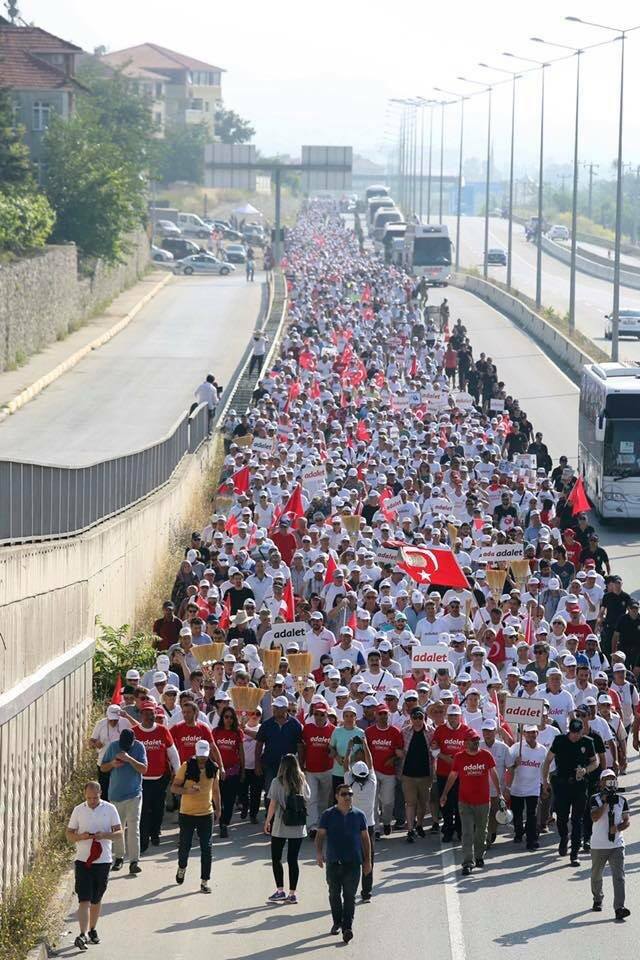Turkey, the long “march for justice”, the most important event organized by the opposition since 2013, ended on 9 July. Hundreds of thousands of people have come down the street to claim “Rights, Legality, Justice”. Chp leader: “We will break the walls of fear”.

“Rights, Legality, Justice”
The long “march for justice” lasted 24 days, organized by the Republican People’s Party (Chp), the main opposition force to the government of the Party for Justice and Development (AKP), the party of President Erdoğan. Hundreds of thousands of people have joined the demonstration that has traveled 450km under the blazing sun of June in the Turkish mountains.
The “march for justice” was organized in order to protest against the detention of a party deputy, Enis Berberoglu. Berberoglu was accused and sentenced to 25 years in prison for delivering confidential information to Chumhuriyet, Turkish opposition newspaper. The case refers to the publication of some evidence of arms delivery from the Mit, the Turkish secret services, to some Islamist groups present in Syria. The publication in 2015 led to the arrest of newspaper editor Can Dundar, and editor-in-chief Erdem Gul.
The protest started from that case, but it embraces the most disparate current needs of the population. “We believe that all segments of society can unite with their differences. They have to act together. We see a parallel between this march and the struggle we carry forward, “said Serpil Kemalbay.
The march, in fact, also joined the families of the victims of Gezi Park, demonstrators killed by police in the summer of 2013. They also participated in “Moms for Peace”, mothers of the victims of the conflict between the State and the Workers Party Of Kurdistan (PKK).
Adherence to the event is not restricted to Turkish territory, but come also from abroad, such as Luis Ayala, Secretary General of the Socialist International.
Thus, the march has taken on a wider meaning, the arrest of the deputy, in fact, is only the last case of a series of violations committed by President Erdogan. Kemal Kilicdaroglu, Chp leader, urged the crowd to continue the fight for justice: “No one thinks this will be the last march. We marched for justice, for the rights of the oppressed, for deputies and journalists in prison, for university professors dismissed, we marched because we oppose the regime of a single man. We will break the walls of fear. ”
There have been several requests accompanied by the motto “Rights, Legality, Justice”: from the end of the state of emergency, to the protection of press freedom to equality and secularism of the state.

The march of justice as civil disobedience
The peaceful demonstration organized by the Chp party seems to invoke the principles of civil disobedience. Everyone recognizes the existence of the right to refuse obedience or to oppose a government whose inefficiency or tyranny, depending on the case, is unbearable. “We want to repeat the Gandhi salt march in the 1930s,” said Republican Party activist Nazim Arda Cagdas. The instrument to reach the goal seems to be this: literally wear the word “Adalet”, “justice”, and recall the protest with which Gandhi put the colonial authorities in difficulty.
The same “Mahatma” resumed Thoreau’s civil disobedience theories: “It is not to be hoped that man cultivates respect for the laws, but rather that he respects what is right. The only obligation that I have the right to arrogate is to always do what I think right.”
In the year since the failed attempted coup, there were about 50,000 arrested people and 110,000 people dismissed as a result of presidential decrees. Since then, the government has succeeded in repressing the so-called “Republican enemies”, true or alleged.
Professors dismissed from the Universities of Ankara had already begun using the “weapon” of civil disobedience. They gather in the parks and teach the same. “In the most violent region of the world, we play the non-violence card,” some teachers say. Two Ankara teachers, accused of belonging to the DHKP-C armed group, are life-threatening because of a prolonged hunger strike. Their motive seems more than obvious, “they just want to get their job back,” reports the wife of one of the two professors.
The protest in the form of civil disobedience and labeled “Adalet” does not want to surrender, pursuing the hope that it can serve something.
Erdoğan’s answer
The non-violent event, organized by the leader of the opposition Chp party, was not positively welcomed by President Erdoğan and his affiliates. The government in that march did not see lay people, religious, university students, teachers, but “terrorists” and “conspirators”.
On the AKP front breathed a tension. Erdoğan threatened to denounce Kilicdaroglu, secretary of the Chp. In addition, the party’s president’s supporters have come down the street to provoke protesters.
The situation, with the passing of days, has not improved, indeed. On July 10, following the end of the march for justice, 42 people were arrested at the universities of Instanbul: Medeniyet and Bogazici.
The accusation is always the same: belonging to Gulen’s network, considered the founder of the attempted coup on July 15, 2016. So, a year later, Erdogan organized a commemoration for the celebration of the anniversary: ”July 15 Was a turning point for the Turkish Republic. From that date nothing is more like before, “said the president.
The line chosen by the Sultan is clear from now on. The rhetoric of “with me or against me” sends to the air the aims of the previous year that hinted at national unity. Opposition parties were excluded from the celebration: the Republicans of Chp and the pro-Kurdish Hdp.
So is this Erdoğan’s response to the opposition signal?
Translation by Lucia Loddo.






